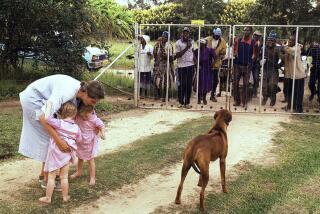S. Africa Says It Continues to Resettle Black Families
JOHANNESBURG, South Africa — Despite assurances that black families would no longer be uprooted from their communities and forced under apartheid to move elsewhere, the South African government said Thursday that it resettled more than 64,000 blacks last year and that 22,000 more are about to be moved.
J. Christiaan Heunis, minister for constitutional development and planning, told Parliament that most of the blacks have agreed to the government’s program of “voluntary relocation” and that force has not been used to move them.
But this was sharply disputed by critics of the government’s resettlement policies. They accused the government of not only reneging on its 1985 pledge to end “forced removals” but of expanding this effort in the last six months.
Errol Moorcroft, a member of Parliament from the white opposition Progressive Federal Party, noted that the reported 1986 resettlement total of 64,180 blacks was more than twice the average of previous years. He described Heunis’ statement as alarming.
‘Coerced Into Agreeing’
The government contends that resettlement is now voluntary and that there are no longer any “forced removals,” but Moorcroft said that “people . . . are coerced into agreeing,” often by government deceit and sometimes by open threats.
Laurine Platzky, a researcher at the National Council Against Removals, said in Cape Town that government policy is to “freeze areas,” allowing no further development or even improvement of facilities, and then to use “a whole range of laws,” from trespass ordinances to health codes, to force blacks to move from communities near areas officially reserved for whites.
“The government creates conditions that prevent a decent life, and then it claims that people are moving voluntarily,” she said, adding that nearly a dozen urban black communities around the country are under “government threat of removal.”
And Alan Morris, a field worker with the Transvaal Rural Action Committee, which is fighting to save a black community of 10,000 at Brits, west of Pretoria, from resettlement much farther from the city, contended that residents of Oukasie, the Brits black township, are adamant about remaining there. He said that force is already being used against them.
“The real reason the township is to be moved and not upgraded, as is feasible and cheaper, is that it is too close to a white area,” Morris said.
Farther From Their Jobs
Most of those who were resettled last year apparently were moved from black ghettos close to white residential areas to new “townships” that are farther from their city jobs but offer improved housing and better facilities.
Some of the largest resettlements--probably more than half of the total reported by Heunis--took place around the industrial centers of Port Elizabeth and Uitenhage in eastern Cape province, where hundreds of black families have been moved from their old communities to new townships under the laws of apartheid, South Africa’s policy of racial separation.
More to Read
Sign up for Essential California
The most important California stories and recommendations in your inbox every morning.
You may occasionally receive promotional content from the Los Angeles Times.









